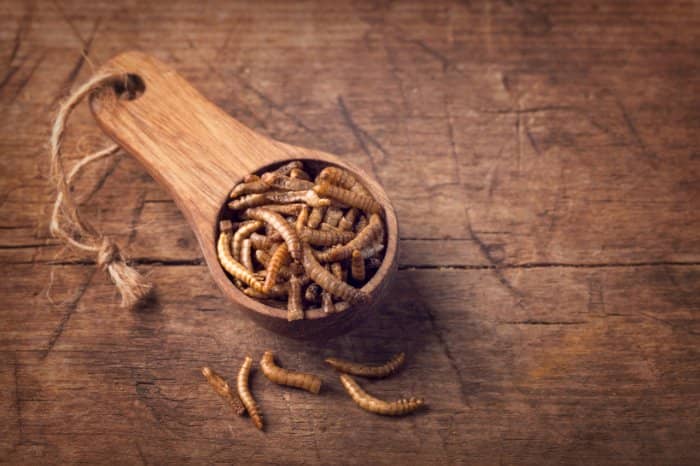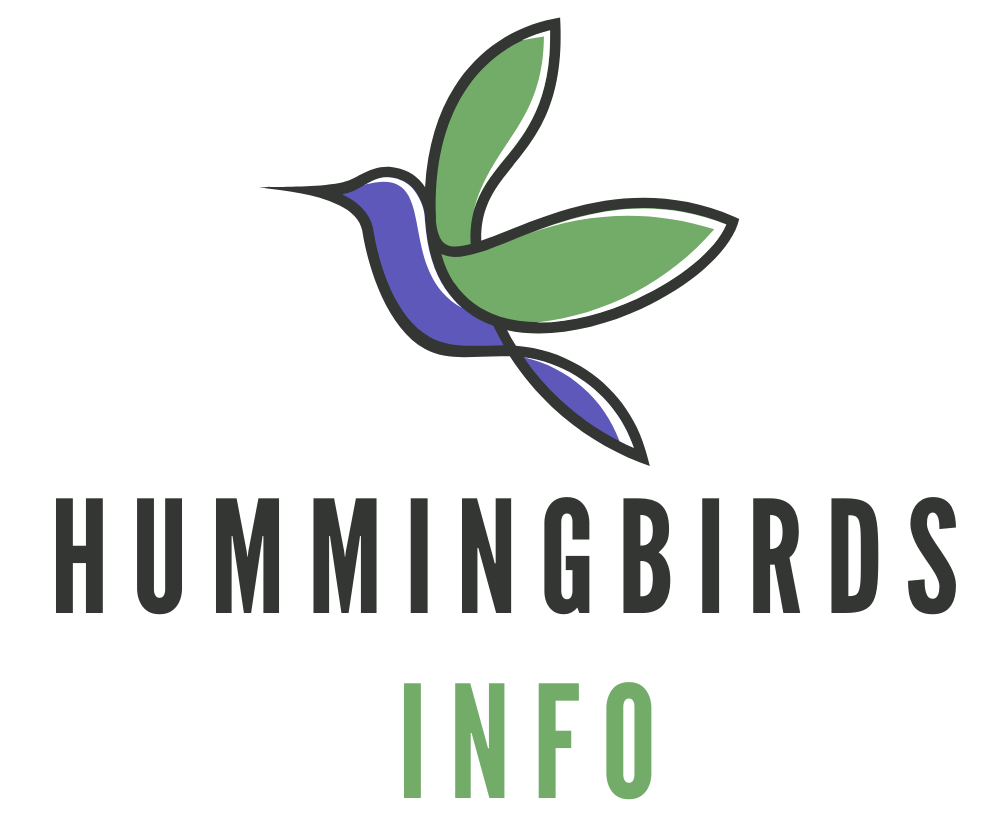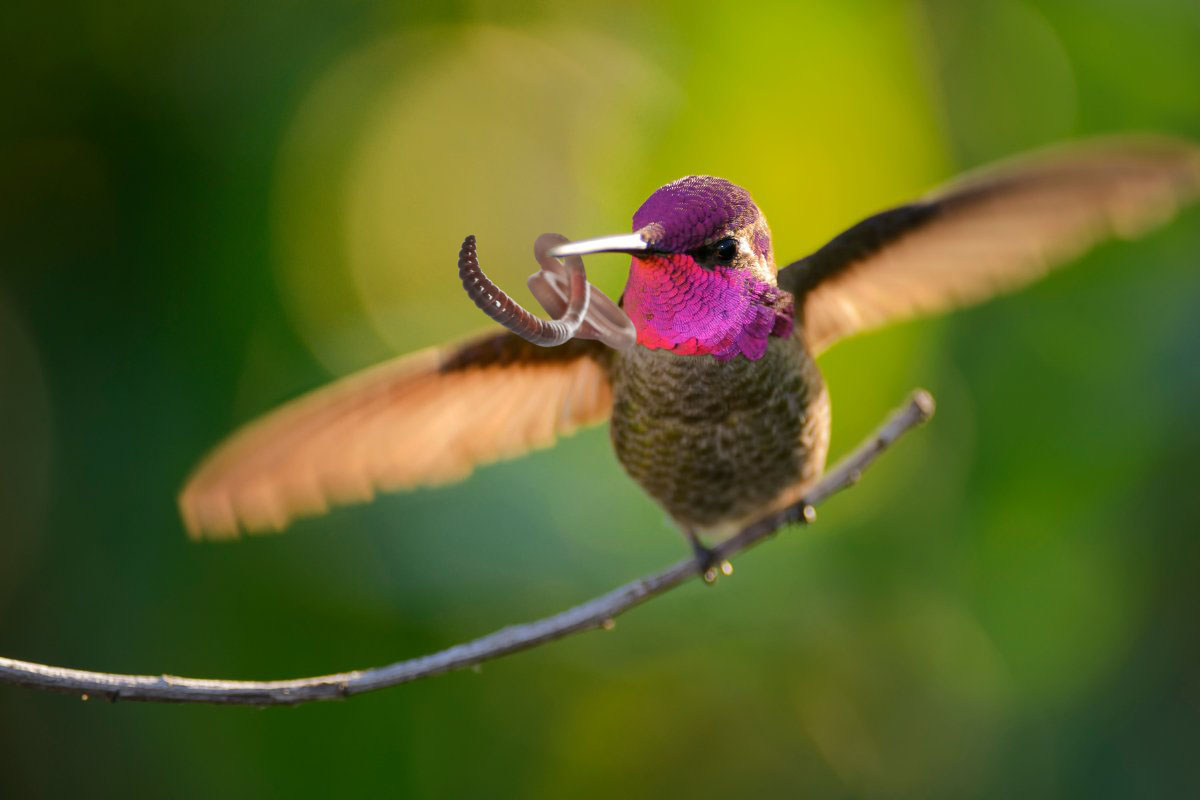Do hummingbirds eat worms? Check out this article and find out. We believe that the answer will surprise you.
You don’t have to be an experienced bird watcher to understand why it is important for a small hummer to have a varied and balanced diet. Continuous learning helps each of us individually create a good habitat in the backyard and thus contribute to ways that ensure the survival of the world’s smallest birds.
We know they enjoy nectar and tree sap, but do hummingbirds eat worms? Let’s find out below.
How Do Hummingbirds Eat?
When you watch hummingbirds buzzing around your yard, you have probably wondered at least once in your life how these creatures can sip the sweet liquid from flowers so quickly. Believe us, this question troubles not only experienced and novice bird watchers but also ornithologists.
Until recently, scientists firmly believed that these birds sip nectar with tubes on their tongues using capillary action. This process is most similar to when sponges and paper towels absorb water. But the change came with the research of the famous Margaret Rubega, who discovered that this is almost impossible to implement, especially when dealing with liquids much denser than water, in this case, nectar.
This versatile scientist and her team discovered that these birds actually have forked tongues with hair-like fibers called lamellae. After being immersed in the nectar, the tongue separates and then automatically closes like a zipper as the tongue pulls back, pulling the nectar back into the beak. So, with this research, the century-old myth that convinced us all that hummingbirds suck nectar has been dispelled. But the truth is actually quite different, therefore, the tongue of these birds does not suck, but grabs and carries nectar into the mouth.
Check Out Do Hummingbirds Eat Apples? Can They Eat Fruits?!
What Do Hummingbirds Prey On?
We guess you were a little confused when you read this headline. It is hard to imagine such gentle creatures as predators, but no matter how strange it sounds to you, it is true. At first, many of us believed that hummingbirds survived only on nectar.
Fortunately, more and more research has been conducted recently, the results of which greatly help us to understand better and appreciate the life of hummingbirds while gaining access to some key dietary information.
One thing is certain, nectar is a crucial food in a hummingbird’s diet, however, we must not forget to mention numerous other living creatures that make up their daily menu. Prey is usually abundant with many essential elements, including:
- Amino Acids
- Fats
- Fiber
- Minerals
- Oils
- Proteins
- Vitamins
Did you know that these birds, like humans, have their preferences in food choices (although humans generally do not eat insects)? Here is a list of their favorite bugs that they will rarely resist:
- Aphids
- Flies
- Grasshoppers
- Mites
- Mosquitoes
- Parasitic wasps
- Spiders
- Weevils
Fluker’s Freeze Dried Insects – for Reptiles, Birds
Are you in the mood for a fun fact? Based on some research, it has been proven that 60% to 80% of a hummingbird’s diet consists of spiders. You didn’t expect that information? Believe us, we were also surprised.
We are now one step closer to answering the question “do hummingbirds eat worms”. Let’s find out some more new information!
Read more about Do Hummingbirds Like Verbena? Create a Bird-Friendly
Do Hummingbirds Eat Insects?
Although it is apparent at first glance that they are built to feed on nectar, they cannot live on nectar alone. Hummingbirds need a source of protein, minerals, and vitamins to withstand all the daily challenges they face. As many of you already know, protein plays a vital role in proper muscle and feather development and is especially crucial for feeding growing chicks.
So yes, these birds eat insects on a daily basis. It’s no secret that they are one of the biggest sources of fat, salt, fiber, amino acids, and a number of nutrients essential for a balanced diet of this world’s smallest bird.
Here’s another fun fact. Did you know that hummingbirds eat from a few dozen to a few hundred or even a thousand insects in just one day? Of course, we have to mention that the amount depends on availability, but you get the point.
Do Hummingbirds Eat Worms?
We assume that at least once you have seen a bird holding a worm in its beak, if not in person, then at least in a photograph. A diet of worms is usually a common food for most birds. But what about the main actors of this blog, do hummingbirds eat worms? It is very difficult to give one concrete answer to this question. The trick is that worms are mostly too awkward or in other words too inconvenient for hummingbirds to hunt for.
Given that hunting for worms is a laborious process considering that they tend to bury themselves in the ground, these birds are more likely to get full by dipping into nectar-rich flowers or turn to hunt more easily available insects and soft-bodied creepy-crawly creatures.
Finally, we must not forget that hummingbirds do not have adapted mouths to chew and swallow a worm so easily (as they do not eat seeds for the same reason).
Do Hummingbirds Eat Mealworms?
Now that you know the answer to the question “do hummingbirds eat worms”, let us explain another thing that bothers our readers. So, although they will generally refuse to eat worms, hummingbirds will choose to eat a mealworm, but only when there is little other food available.

To Conclude: Do Hummingbirds Eat Worms?
In short, worms and hummingbirds will rarely meet, and if they do, the predator would really struggle to eat its prey. They just aren’t a good fit. However, we cannot 100% confirm that this has never happened before or will never happen. Some things are just hard to influence or guess. Mother Nature always does what she thinks is best, so it is the same in this case.
Have some questions? Let us know more in the section below.
Related this article: Can You Use Granulated Sugar For Hummingbirds?


